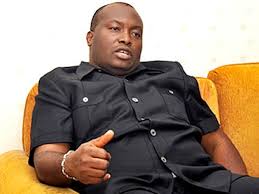Featured
Sen. Ifeanyi Ubah is Authentic Chairman of Anambra State FA – Dare Declares

Featured
From U.S. Alarm to Tinubu’s Validation

U.S. President Donald Trump’s recent decision to list Nigeria as a “Country of Particular Concern” triggered a wave of reactions across diplomatic and political circles.
While many Nigerians viewed the designation as a national embarrassment and critics seized it as evidence of deepening instability, the development has taken on a surprising twist: it has become an unintended validation of President Bola Ahmed Tinubu’s ongoing reforms.
For global observers, Trump’s warning underscored the security and governance challenges facing Africa’s largest democracy. But within Nigeria, it cast renewed attention on Tinubu’s attempts to tackle the very issues that led to the U.S. designation from terror attacks and mass kidnappings to deep rooted economic distortions.
Political analysts note that long before Trump’s statement, Tinubu had already begun overhauling Nigeria’s security and economic systems, taking steps more far-reaching than those implemented by his predecessors. Trump may have amplified global concern, but Tinubu had already moved into the repair phase.
Upon assuming office, Tinubu inherited a nation strained by years of structural decline a costly fuel subsidy regime, an opaque multi-tiered foreign exchange system, rising insecurity, and widening regional imbalances. Instead of opting for gradualism, he pursued sweeping measures aimed at resetting Nigeria’s foundations.
One of his earliest actions was an overhaul of the security architecture. Tinubu dismissed and replaced the previous service chiefs, appointed field tested commanders, strengthened joint operations, and demanded measurable results. The armed forces intensified land and air offensives, resulting in major arrests, rescue operations, and the neutralisation of terror cells. Security improvements were coupled with community-level interventions to break cycles of violence and restore economic activity in long neglected regions.
Economically, Tinubu took two of the most contentious decisions in decades: removal of petrol subsidy and unification of the exchange rate. His administration framed the decisions as necessary to end fiscal leakages and curb entrenched rent-seeking. Though the reforms generated short-term hardships, they also freed revenue for federal and state governments and signaled to investors that Nigeria was ready for structural cleanup.
In governance, Tinubu implemented what analysts describe as an equity-driven restructuring of the federation. Every geopolitical zone now has a dedicated regional development commission a move designed to institutionalise fairness and ensure balanced growth. This expansion is widely regarded as one of the administration’s most strategic long-term decisions.
Meanwhile, Nigeria is witnessing what officials describe as a new wave of infrastructure expansion. Work is underway on the multi-state Lagos–Calabar Coastal Highway, the Sokoto–Badagry Super Highway, major rail upgrades, power sector reforms, and the rehabilitation of key federal roads. Port modernization projects are also accelerating to position Nigeria as a competitive maritime hub.
International confidence appears to be responding to these reforms. Tinubu has pursued aggressive economic diplomacy, securing investment commitments from the UAE, Germany, Saudi Arabia, the United States, and leading multinationals. Government officials report that more than $30 billion in investment pledges were recorded during the administration’s first year.
The government has also launched a comprehensive tax reform effort aimed at curbing multiple taxation, expanding the tax net, and strengthening transparency a shift intended to help raise Nigeria’s historically low tax-to-GDP ratio.
As global reactions to Trump’s warning continue, Nigerian officials argue that the designation inadvertently highlights a turning point rather than a downward spiral. While the U.S. warning spotlighted Nigeria’s challenges, Tinubu’s defenders say the administration is already confronting those challenges with bold, long-term reforms.
In this framing, Trump’s alarm has become a backdrop that underscores the urgency of Tinubu’s agenda and, paradoxically, the evidence of its relevance.
Supporters of the president say the label “country of concern” is being transformed into a story of a country in recovery, driven by a leader intent on reversing years of stagnation. According to them, Tinubu’s approach prioritising difficult reforms over popular short-term fixes is precisely what positions Nigeria for renewed global confidence.
In a twist of geopolitical irony, what was meant to warn the world about Nigeria may now be drawing attention to an unfolding attempt at national renewal.
-

 Featured6 years ago
Featured6 years agoLampard Names New Chelsea Manager
-

 Featured6 years ago
Featured6 years agoFG To Extends Lockdown In FCT, Lagos Ogun states For 7days
-

 Featured6 years ago
Featured6 years agoChildren Custody: Court Adjourns Mike Ezuruonye, Wife’s Case To April 7
-

 Featured6 years ago
Featured6 years agoNYSC Dismisses Report Of DG’s Plan To Islamize Benue Orientation Camp
-

 Featured4 years ago
Featured4 years agoTransfer Saga: How Mikel Obi Refused to compensate me After I Linked Him Worth $4m Deal In Kuwait SC – Okafor
-
Sports3 years ago
TINUBU LAMBAST DELE MOMODU
-

 News11 months ago
News11 months agoZulu to Super Eagles B team, President Tinubu is happy with you
-
Featured6 years ago
Board urges FG to establish one-stop rehabilitation centres in 6 geopolitical zones
